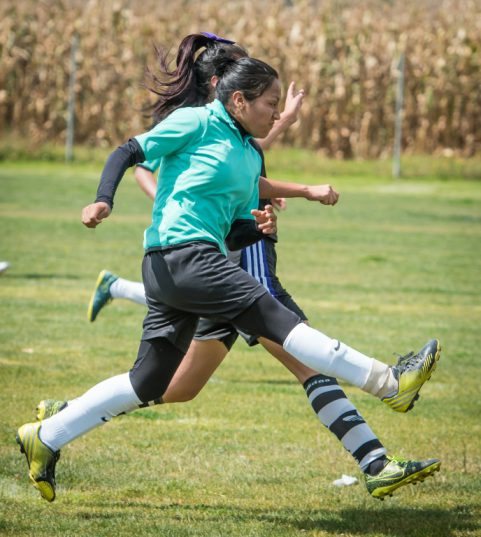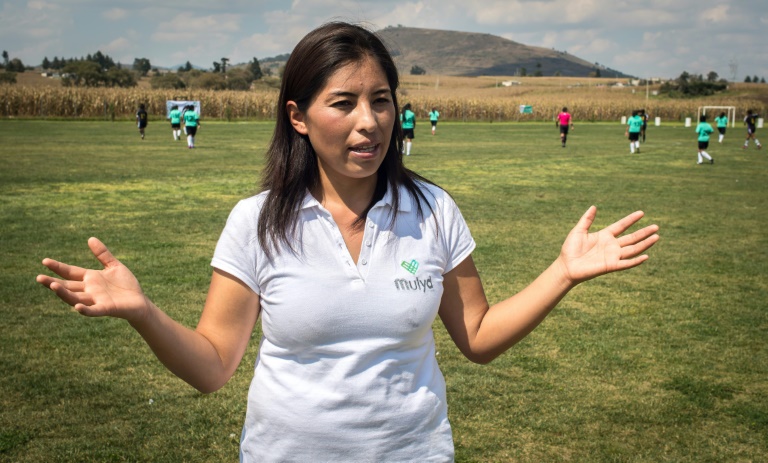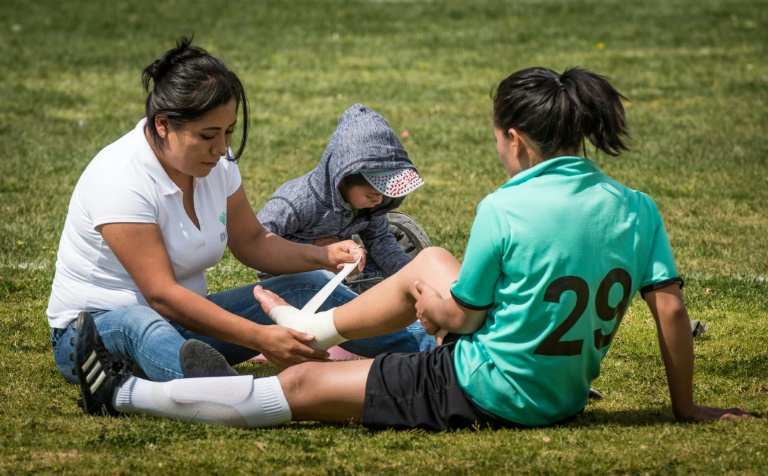Guadalupe Garcia, an indigenous Mexican woman, was working as a maid when she fell in love -- not with her boss, like a hackneyed telenovela plot, but with football.
Garcia, a petite but powerful athlete with a sharp mind and wide smile, was not allowed to play football growing up as a poor Mazahua indigenous girl in the small village of San Juan Coajomulco.
She got her first chance as a young adult, and discovered that football is “an act of rebellion” in a country where the sport is still seen as a boys’ game, she says.
Garcia will be a keynote speaker this week at the Women’s Forum Mexico, an event designed to bring together influential voices to address the deep-rooted problems facing women in the country.
Today Garcia, 34, runs a football club for Mazahua girls and young women, using the sport to empower them in a country where machismo runs deep and violence against women is rampant.
Her goal, she says, is to instill in them a vital message: “This body is mine, and nobody touches it unless I want.”
The state of Mexico, where she lives, has the worst rate of deadly violence against women in the country.
Last year, at least 263 women were murdered in the central state, according to the rights group OCNF.
Their bodies turn up almost daily — raped, mutilated, half-burnt, floating in rivers of sewage or even buried in their murderers’ yards.

Daysi Cruz Sanchez of the Mazahua soccer team vies for the ball during the match against “Hadas B” team of the Mexican Women Soccer league, Premier category
Since Garcia founded her program two years ago, she has coached around 300 Mazahua girls in the skills of life and football.
The game is still largely forbidden in their world — a deeply traditional one, where men hold the power, girls are often removed from school to marry young, and many families refuse to let their daughters “open their legs” running around a football pitch.
“We have to get each other’s backs!” Garcia tells her girls in a pep talk before one recent match between the Seleccion Mazahua — a club with 25 players aged 16 to 26 — and a local private school, both playing in the first division of the Mexican Women’s Football League.
Her club went on to lose 4-1. It doesn’t matter to Garcia.
The important thing is empowering them, she says.
– Bloody family history –

Guadalupe Garcia Alvarez, who organized the Mazahua soccer team, says playing football has been “an act of rebellion” against traditional expectations
Garcia knows the horrific problem of gender violence up close.
“My mother was orphaned at 11 years old when my grandfather beat my grandmother to death,” she says.
Her father was an alcoholic, and her family forced her two sisters to get married at 14 and 15 years old.
She herself was sent to work as a maid.
“But I liked to read, and that enabled me to discover things… which made me disobedient,” she says with a sly smile.
Fired from her job, she started playing in amateur football clubs.
“Taking to the football pitch has been an act of rebellion for me,” she says. “It enabled me to avoid getting pregnant as a teenager, getting married too young.”
She got married at 23, and now has two children.
It hasn’t diminished her passion for her football program, which is financed by several Mexican rights groups.
– Girl power –

Although winning isn’t Garcia’s main goal, she has shown a knack for grooming talented young recruits.
Four of her girls currently play for private clubs on scholarships that cover their education, housing and living expenses.
One, 14-year-old Liliana Gonzalez, is being scouted by the Mexican national team.
She is the star keeper for Lioness FC, in the city of Metepec.
Football, she says, “is a way to fight back against machismo — with a ball.”
Rocio Lopez, 26, is one of Garcia’s current stars.
The head of an indigenous education center, she can be found scoring goals in her free time on the club’s pitch, a field surrounded by dry corn cobs.
“Men are learning that we are just as good as they are,” she says defiantly, her mouth bright with orange lipstick.
“If they can wear shorts, we can too. If they can kick a ball, we can too.”






